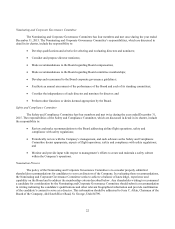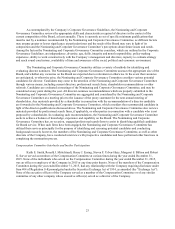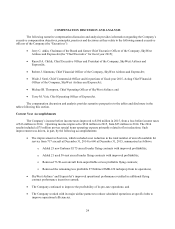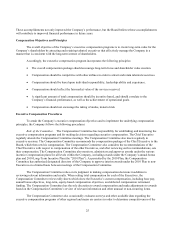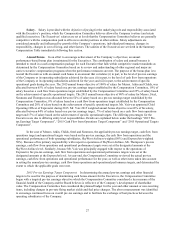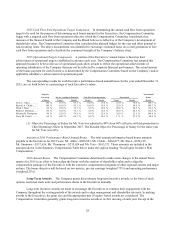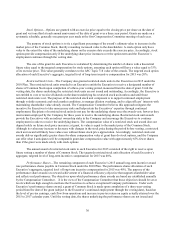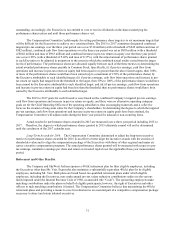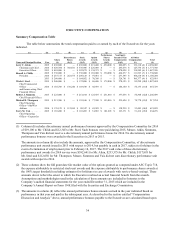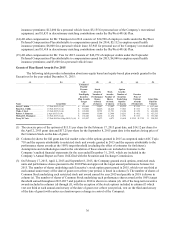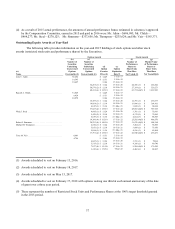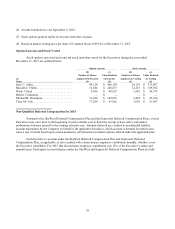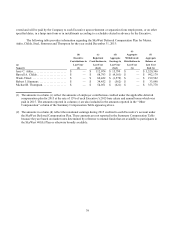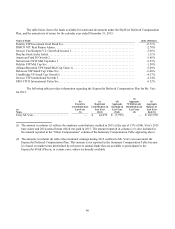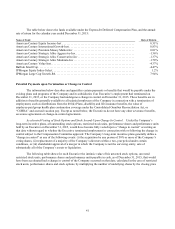SkyWest Airlines 2015 Annual Report Download - page 134
Download and view the complete annual report
Please find page 134 of the 2015 SkyWest Airlines annual report below. You can navigate through the pages in the report by either clicking on the pages listed below, or by using the keyword search tool below to find specific information within the annual report.32
The Company also maintains the SkyWest, Inc. 2002 Deferred Compensation Plan, a non-qualified deferred
compensation plan for the benefit of officers and other highly compensated employees. All of the Executives other than
Mr. Vais participate in the SkyWest, Inc. 2002 Deferred Compensation Plan. ExpressJet also maintains a separate but
similar non-qualified deferred compensation plan, the ExpressJet Executive Deferred Compensation Plan, for its highly
compensated management employees, including Mr. Vais. Under both such deferred compensation plans (the “Deferred
Compensation Plans”), the employer credits each Executive’s account with a discretionary employer contribution equal
to 15% of salary and annual bonus. These amounts are included in the Summary Compensation Table under the column
“All Other Compensation”. Additional information on the Deferred Compensation Plans is found in the section
“Non-Qualified Deferred Compensation for 2015” below.
The SkyWest Inc. 2002 Deferred Compensation Plan (but not the ExpressJet Executive Deferred Compensation
Plan) also permits eligible executives, including the Executives, to elect in advance of each calendar year to defer up to
100% of their cash salary and annual bonus compensation for the year. Only Mr. Thompson elected to defer any portion
of his salary or annual bonus for 2015. The Company and its subsidiaries do not maintain any defined benefit pension
plans for the Executives.
Other Benefits. In addition to the benefits described above, the Company provides certain other benefits to
the Executives that the Compensation Committee believes are generally consistent with the benefits provided to senior
executives of other airlines. The Compensation Committee believes that those benefits, which are detailed in the
footnotes to the Summary Compensation Table applicable to the heading “All Other Compensation” below, are
reasonable, competitive and consistent with overall executive compensation objectives. Those benefits consist primarily
of employer-paid premiums on health, dental and eye insurance, a personal automobile allowance, and use of Company
owned recreational equipment.
The Company and its subsidiaries also maintain a non-discriminatory, broad based program under which all
full-time employees and their dependents, including the Executives and their dependents, may fly without charge on a
space available basis on regularly scheduled flights of aircraft operated by the Company’s operating airline subsidiaries.
Ownership Guidelines
The Company maintains ownership guidelines for the Executives to encourage the alignment of their interests
with the long-term interests of the Company’s shareholders. Each Executive is strongly encouraged to maintain a
minimum ownership interest in the Company. The guideline ownership level is a number of shares of Common Stock
having a value equal to a recommended multiple of the annual base salary for each Executive. Any Executive that did
not meet the guidelines at December 31, 2015 is encouraged to make progress towards the ownership guideline. The
holdings of the Executives are summarized in the table entitled “Security Ownership of Certain Beneficial Owners”
below.
Deductibility of Executive Compensation
Section 162(m) of the Code imposes a $1 million annual limit on the amount that a publicly traded company
may deduct for compensation paid to the company’s principal executive officer during a tax year or to any of the
company’s three other most highly compensated executive officers who are still employed at the end of the tax year
(other than the Company’s principal financial officer). The limit does not apply to compensation that meets the
requirements of Section 162(m) of the Code for “qualified performance-based compensation” (i.e., compensation paid
only if the executive meets pre-established, objective goals based upon performance criteria approved by the Company’s
shareholders). The Compensation Committee reviews and considers the deductibility of executive compensation under
Section 162(m) of the Code. In certain situations, the Compensation Committee may approve compensation that will not
meet the requirements of Code Section 162(m) in order to ensure competitive levels of total compensation for its
executive officers. Stock options and performance shares awarded to the Executives during 2015 were intended to
constitute “qualified performance-based compensation” under Section 162(m) of the Code. The Company’s 2015


